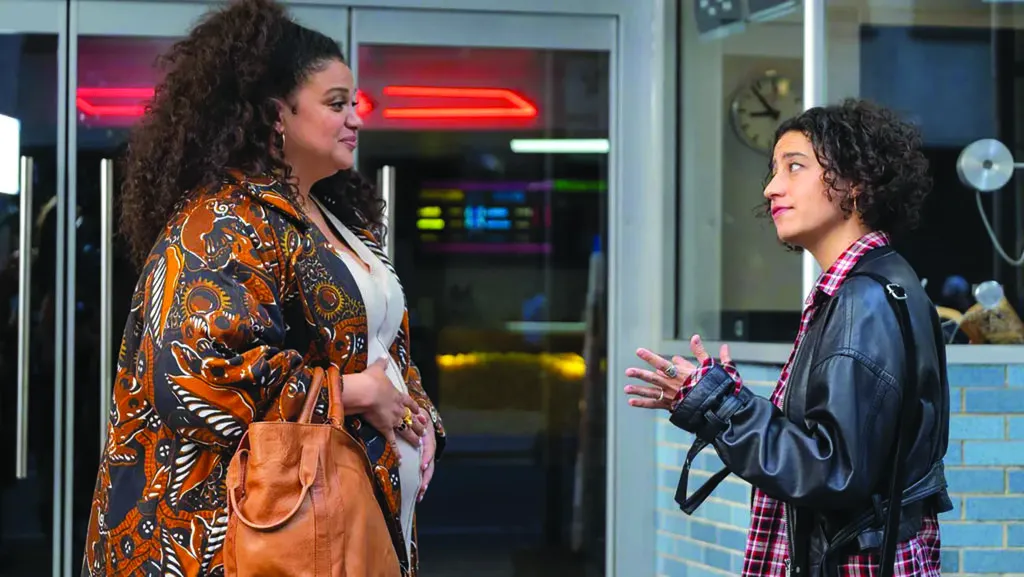
The problem with pregnancy movies is that they never feel quite right. Waters break like fire hoses, and within seconds, a 6-month-old-looking baby is presented neatly and cleanly on the mother’s chest. If you’re childless, it’s unrelatable and boring. If you’re a mother, it’s unrelatable and irritating because it’s nothing like what actually happens. If you’re a man, you probably didn’t pick the movie.
That’s why, to do anything funny or poignant about pregnancy, you really have to surrender the dramatics. In Babes, Pamela Adlon’s (Californication, Louie) directorial debut about a pair of best friends discovering motherhood, both women slip into labor unknowingly, with more of a “light p***y drizzle” than a gush, and both women volunteer to check the size of the other’s dilation for reasons such as analyzing if there’s any time to grab a quick bite (caviar and oysters), as friends do.
In Babes, it’s not the pregnancies that seem hard but navigating the friendship between the two leads, Dawn (Michelle Buteau) and Eden (Ilana Glazer), during them. The lifelong BFFs have taken different steps toward motherhood: Dawn is married with a toddler and has an almost overbearing maternal instinct, while Eden is a single free spirit type who gets knocked up after an unprotected one-night stand with a man who shortly after proceeds to choke to death on an almond alone on Thanksgiving, a seemingly important subplot that garnered no emotion from me at all. Yoga teacher Eden’s dependency on mother-of-two Dawn quickly results in resentment. Eden wants to swan through single motherhood equipped with nothing but Dawn by her side, to the point that she asks to move into her basement. Dawn wants to mother her two children, save her marriage, and maybe even get a promotion at the dental office she works at.

Clearly aiming to be the Bridesmaids of birthing comedies, Babes in many of its scenes takes a genuinely funny moment or one-liner and exhausts it. Both women are naturally charismatic and funny presences on screen (both are stand-up comedians). But some of the extended gags, such as the ones about the size of an amnio needle or the monstrous breast pump contraption, left me feeling like I do when an awkward acquaintance tries a bad joke and then sits waiting for a laugh. In the end, you give it to them out of sheer embarrassment before trying your best to erase it from memory. As well as the jokes, the political correctness or attempts to mock it (I couldn’t tell which one) are shoehorned in. “I’m gonna be a mamacita. Wait, no, that’s appropriation.” “Do you wanna know the sex?” “No, I don’t want to put a binary on them right now.”
Unfortunately for Babes, as with labor, all of the exciting stuff happens in the last few minutes. We get to watch Eden’s character progress from a freeloading and juvenile archetypal millennial woman into a thoughtful and grateful mother and friend. As we see her baby placed in her arms, we hear, for the first time, a real, emotive monologue. After delivering the baby, she laments how absurd it is that women’s bodies are even capable of that, never mind that it happens every minute of every day. “Why aren’t we talking about this all the time?” she asks. It was a genuinely moving scene that saw me and the only other woman in the child-friendly, mommy-targeted midday screening Alamo Drafthouse had organized for the film burst into tears.
Though Babes is marketed as a fun-loving, intentionally crude, and no-nonsense view of pregnancy, the heart of the film feels almost accidentally conservative, something that’s been true of others of its genre, such as Knocked Up and Juno, not to mention the most recent Bond, which sees the ultimate manly man finally find fulfillment of his true purpose on Earth only when he has a child. We watch two hip mothers navigating through life in Queens and the Upper West Side, one choosing the more traditional notion of motherhood and the other kind of falling into it but both ultimately becoming better for doing so. It may be littered with jokes about poop and breast milk and rely too heavily on the “I can’t believe she just said that!” shtick. But what you leave the cinema with is something no joke can cheapen: the feeling that motherhood, of all different kinds, is magical.
CLICK HERE TO READ MORE FROM THE WASHINGTON EXAMINER
Kara Kennedy is a freelance writer living in Washington, D.C.







